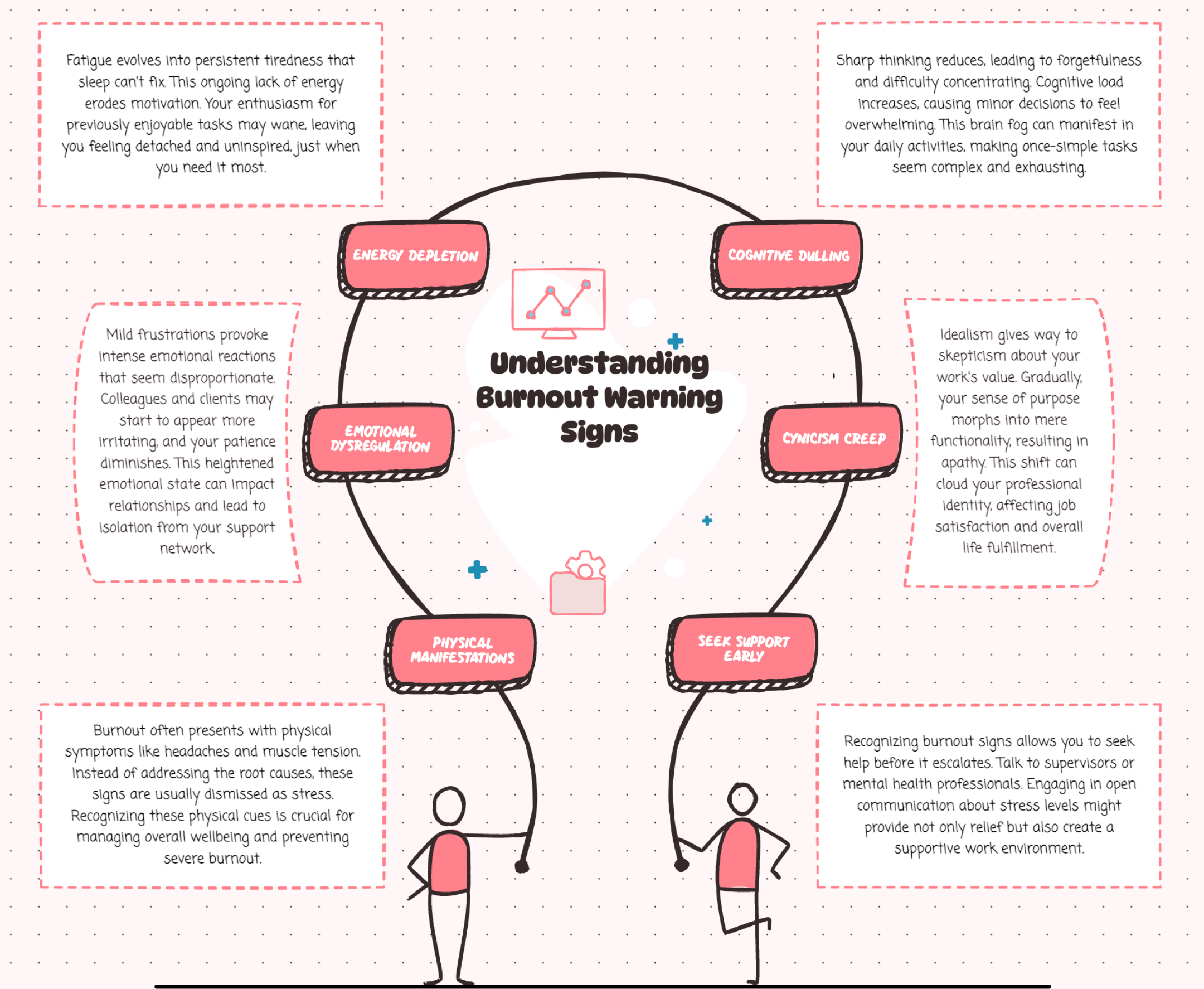ALorem ipsum dolor sit amet, consectetur adipiscing elit. Maecenas eu porta tellus. Mauris sit amet efficitur velit, vitae mollis ipsum. Cras a facilisis sem, vulputate accumsan diam. Praesent molestie, mauris nec dictum condimentum, sem metus lobortis orci, vitae auctor nunc ante et nunc. Phasellus dui ligula, hendrerit eget urna sed, porttitor sagittis libero. Nam tempor felis quis erat imperdiet pulvinar. Aenean euismod vitae nibh eu pretium. Cras quis elementum risus, nec ultrices felis. Nulla aliquet elementum erat et finibus. Quisque aliquam quam ultrices nibh congue sollicitudin
It's a scenario playing out with increasing frequency across industries: ambitious young professionals, barely a year into their careers, finding themselves completely depleted. Morning alarms trigger dread rather than motivation. Work that once sparked passion now feels meaningless. The body and mind send distress signals through insomnia, anxiety, and a pervasive sense of emptiness.
This is burnout—not after decades of career strain, but at 25, with forty-plus working years still stretching ahead.
Society perpetuates a dangerous myth that burnout is reserved for mid-career professionals or those approaching retirement—individuals who have "earned" their exhaustion through years of relentless work. Young professionals often internalise this narrative, believing their youth, enthusiasm, and relative inexperience somehow make them immune to the condition.
This misconception is not just wrong; it's harmful. Research increasingly shows that early-career professionals are actually more vulnerable to burnout than their more experienced colleagues. Without established boundaries, perspective gained through experience, or the confidence to push back against unreasonable demands, many young workers find themselves depleted before they've even fully launched their careers.

Several factors make today's early-career landscape particularly conducive to premature burnout:
The Digital Tether: Unlike previous generations who could physically leave work behind, today's professionals exist in a state of perpetual connectivity. When work emails reach your smartphone at all hours, the psychological separation between professional and personal life dissolves. For young professionals eager to prove themselves, this often translates to de facto 24/7 availability.
Compressed Career Timelines: Previous generations expected career advancement to unfold over decades. Today's workplace culture often celebrates and normalises rapid achievement, creating pressure to accomplish in years what once took decades. This compression leaves little room for sustainable pacing or recovery.
Identity Fusion: Young professionals frequently experience a dangerous merging of personal identity with professional output. When who you are becomes inseparable from what you produce at work, every professional setback becomes an existential crisis, and rest feels like a betrayal of self rather than a necessity.
The Comparison Vortex: Social media creates a distorted view of peers' success, showcasing carefully curated highlights while obscuring struggles. This manufactured comparison point makes many young professionals feel perpetually behind, driving them to work harder and longer in pursuit of an illusory standard.
Diminished Support Structures: Geographic mobility, remote work, and the gig economy have eroded traditional workplace mentorship and community support. Many young professionals navigate their early careers in relative isolation, without guidance on sustainable work practices.

Burnout rarely announces itself dramatically. Instead, it manifests through subtle shifts that are easily dismissed or misattributed, especially by those experiencing them for the first time:
Energy Depletion: What begins as occasional tiredness evolves into persistent fatigue that sleep doesn't resolve. The ability to summon enthusiasm, even for previously engaging tasks, progressively diminishes.
Cognitive Dulling: Sharp thinking gives way to brain fog. Memory becomes unreliable. Concentration wavers. Decision-making, even on minor matters, becomes inexplicably difficult.
Emotional Dysregulation: Minor workplace frustrations trigger disproportionate emotional responses. Colleagues or clients who were once easy to engage with suddenly seem irritating or unreasonable.
Cynicism Creep: Initial idealism about making an impact gradually transforms into skepticism about whether any of it matters. Purpose erodes into mere function.
Physical Manifestations: The body sends increasingly insistent signals—headaches, digestive issues, muscle tension, compromised immunity—that are often attributed to everything except their actual cause.
What makes these signs particularly dangerous for young professionals is the tendency to normalise them as simply "how work feels" rather than recognising them as symptoms of an unsustainable situation.
While individual factors certainly contribute to burnout, focusing exclusively on personal resilience or self-care obscures the systemic issues at play. Many workplaces—particularly in high-prestige or competitive fields—are structured in ways that virtually guarantee burnout:
The cultural glorification of overwork masquerading as "hustle culture" or "paying dues"
Inadequate staffing models that rely on employees regularly exceeding reasonable capacity
Performance metrics that measure hours or output volume rather than quality or sustainability
Informal reward systems that celebrate those who sacrifice personal wellbeing for work
Technology practices that assume constant connectivity and immediate responsiveness
Young professionals often lack the context to recognise these structural problems, instead internalising them as personal deficiencies when they struggle to keep pace.

Addressing early-career burnout requires more than resilience training or wellness programs—it demands a fundamental reconsideration of how young professionals approach their careers:
Reimagining Success Timelines: The most sustainable careers aren't sprints but marathons. Short-term achievement at the cost of wellbeing inevitably leads to diminishing returns and potential derailment. Early-career professionals must develop metrics for success that extend beyond immediate output to include sustainability.
Establishing Functional Boundaries: Rather than setting aspirational boundaries that crumble under pressure, young professionals need practical systems for separating work from life—whether through technology management, physical separation, or communication protocols.
Developing Recovery Literacy: Just as athletic training includes deliberate recovery periods, professional performance requires understanding how to restore depleted physical, emotional, and cognitive resources. This isn't indulgence but maintenance of the most important professional asset.
Cultivating Multiple Identities: Resilience against burnout increases when individuals maintain meaningful identities and communities outside of work. Even during intense career-building phases, connections to non-work sources of meaning and value provide essential perspective.
Recognising Systemic Factors: Understanding that burnout stems from workplace structures as well as individual choices allows young professionals to advocate for healthier conditions rather than simply trying to adapt to unsustainable ones.
For young professionals experiencing burnout or its warning signs, perhaps the most important perspective shift is temporal. At 25, with potentially forty years of professional life ahead, sustainability isn't optional—it's essential.
This doesn't mean abandoning ambition or accepting mediocrity. Rather, it means recognising that genuine professional excellence requires pacing, boundaries, and regular renewal. The most impressive careers aren't characterised by spectacular early burnout but by consistent contribution over decades.
The ability to recognise and address burnout early in one's career often becomes a competitive advantage. While peers cycle through periods of unsustainable overwork followed by forced recovery or career changes, those who master sustainable high performance maintain momentum toward their most important goals.
At WCFC Academy, we believe that professional development must include sustainability as a core competency, not an afterthought. Our growth programme helps young professionals develop the systems, boundaries, and recovery practices that enable long-term excellence without burnout.
We emphasise that preventing or recovering from burnout isn't about working less—it's about working better. It's about aligning effort with impact rather than hours, and ensuring that early career choices build toward sustainable success rather than premature depletion.
The reality is clear: burnout at 25 isn't an anomaly or a sign of weakness. It's the predictable outcome of a system that values immediate output over sustainable performance. But by recognising this reality early, young professionals can chart a different course—one that allows for achievement without sacrifice, ambition without depletion, and careers that remain engaging and rewarding decades after they begin.
Visit www.wcfc.academy to learn how we can help you or your organisation build pathways to sustainable excellence from day one.
“Raesent molestie, mauris nec dictum condimentum, sem metus lobortis orci, vitae auctor nunc ante et nunc ligula”



Your potential is infinite. Our mission is to activate and unleash it in the right environment.